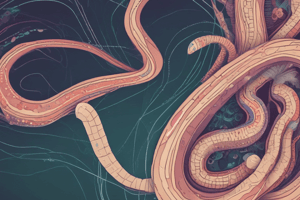Podcast
Questions and Answers
What is a lifestyle modification that can help manage GERD?
What is a lifestyle modification that can help manage GERD?
- Elevating the head of the bed (correct)
- Consuming more citrus fruits
- Eating larger meals
- Drinking more coffee
What type of medication is commonly used as a first-line treatment for GERD?
What type of medication is commonly used as a first-line treatment for GERD?
- Antacids
- Proton pump inhibitors (PPIs) (correct)
- Prokinetic agents
- Histamine-2 (H2) receptor antagonists
What is the purpose of laparoscopic Nissen fundoplication?
What is the purpose of laparoscopic Nissen fundoplication?
- To wrap a portion of the gastric fundus around the sphincter area of the esophagus (correct)
- To inserted a pacemaker in the stomach
- To remove the lower esophageal sphincter
- To bypass the stomach altogether
What type of medication is Baclofen classified as?
What type of medication is Baclofen classified as?
What is the mechanism of action of antacids?
What is the mechanism of action of antacids?
What is the primary cause of excessive reflux in Gastroesophageal Reflux Disease (GERD)?
What is the primary cause of excessive reflux in Gastroesophageal Reflux Disease (GERD)?
Which of the following is NOT a clinical manifestation of GERD?
Which of the following is NOT a clinical manifestation of GERD?
What is the gold standard for the diagnosis of GERD?
What is the gold standard for the diagnosis of GERD?
Which of the following is associated with an increased risk of GERD?
Which of the following is associated with an increased risk of GERD?
What is a common complication of GERD?
What is a common complication of GERD?
What is the primary goal of patient education in GERD management?
What is the primary goal of patient education in GERD management?
Which of the following is NOT a diagnostic finding in GERD?
Which of the following is NOT a diagnostic finding in GERD?
What is a potential outcome of untreated GERD?
What is a potential outcome of untreated GERD?
Flashcards are hidden until you start studying
Study Notes
Gastroesophageal Reflux Disease (GERD)
- A common disorder characterized by backflow of gastric or duodenal contents into the esophagus, causing symptoms and/or mucosal injury to the esophagus.
Causes of GERD
- Incompetent lower esophageal sphincter
- Pyloric stenosis
- Hiatal hernia
- Motility disorder
- Tobacco use
- Coffee drinking
- Alcohol consumption
- Gastric infection with Helicobacter pylori
- Can occur in patients with irritable bowel syndrome, obstructive airway disorder exacerbations, peptic ulcer disease, and angina
- Increases with aging
Clinical Manifestations
- Pyrosis (heartburn, a burning sensation in the esophagus)
- Regurgitation
- Dyspepsia (indigestion)
- Dysphagia or odynophagia
- Hypersalivation
- Esophagitis
- Can result in dental erosion, ulcerations in the pharynx and esophagus, laryngeal damage, esophageal strictures, adenocarcinoma, and pulmonary complications
Assessment and Diagnostic Findings
- History
- Ambulatory pH monitoring (gold standard for diagnosis)
- Endoscopy or barium swallow to evaluate damage to the esophageal mucosa and rule out strictures and hernias
- Ambulatory pH monitoring involves transnasal catheter placement or endoscopic wireless capsule placement for approximately 24 hours
Management
- Educating patients to avoid situations that decrease lower esophageal sphincter pressure or cause esophageal irritation
- Lifestyle modifications:
- Tobacco cessation
- Limiting alcohol
- Weight loss
- Elevating the head of the bed
- Avoiding eating before bed
- Altering the diet
- Medical management:
- Antacids/Acid Neutralizing agents (e.g. calcium carbonate, aluminum hydroxide, magnesium hydroxide and simethicome, alginate)
- Histamine-2 (H2) receptor antagonists (e.g. famotidine, cimetidine)
- Prokinetic agents (metoclopramide)
- Proton pump inhibitors (PPIs) (First-line drugs used)
- Reflux inhibitors (Bethanechol chloride)
- Surface agents/Alginate-based barriers (Sucralfate)
- Inhibitors of transient lower esophageal sphincter relaxations (TLESRs) (Baclofen)
- Surgical management:
- Open or laparoscopic Nissen fundoplication (wrapping of a portion of the gastric fundus around the sphincter area of the esophagus) if medical management is unsuccessful
Studying That Suits You
Use AI to generate personalized quizzes and flashcards to suit your learning preferences.




